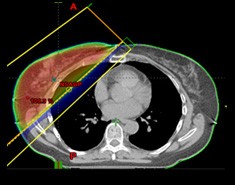April 6, 2015 - Although expert guidelines in 2011 endorsed shorter, hypofractionated whole breastirradiation (WBI) for selected patients with early-stage breast cancer and permitted hypofractionated WBI for other patients, by 2013, the rate of patients who recevied WBI tapered off.
Hypofractionated WBI taked just 3 to 5 weeks of treatment compared to conventional WBI, which take 5-7 weeks of treatment.

Source: Whole breast radiation therapy. Radiation Oncology UCLA.
The retrospective study used administrative claims data from 14 commercial health care plans.The outcomes for the study included use of hypofractionated and conventional WBI, total and radiotherapy-related health care expenditures, and patient out-of-pocket expenses. Patient and clinical characteristics included year of treatment, age, comorbid disease, prior chemotherapy, axillary lymph node involvement, intensity-modulated radiotherapy, practice setting, and other contextual variables.
The results showed hypofractionated WBI increased from 10.6% in 2008 to 34.5% in 2013 in the hypofractionation-endorsed cohort and from 8.1% in 2008 to 21.2% in 2013 in the hypofractionation-permitted cohort. Adjusted mean total health care expenditures in the 1 year after diagnosis were $28,747 for hypofractionated and $31,641 for conventional WBI in the hypofractionation-endorsed cohort and $64,273 for hypofractionated and $72,860 for conventional WBI in the hypofractionation-permitted cohort. Adjusted mean total 1-year patient out-of-pocket expenses were not significantly different between hypofractionated vs conventional WBI in either cohort.
The researchers concluded that although shorter, hypofractionated whole breastirradiation (WBI) for selected patients with early-stage breast cancer and permitted hypofractionated WBI for other patients was endorsed in 2011, the rates dropped by 2013.




